In this article:
For ages, therapeutic plants have been utilized to combat various illnesses. One such plant is Lawsonia inermis, commonly known as henna, which belongs to the Lythraceae family.
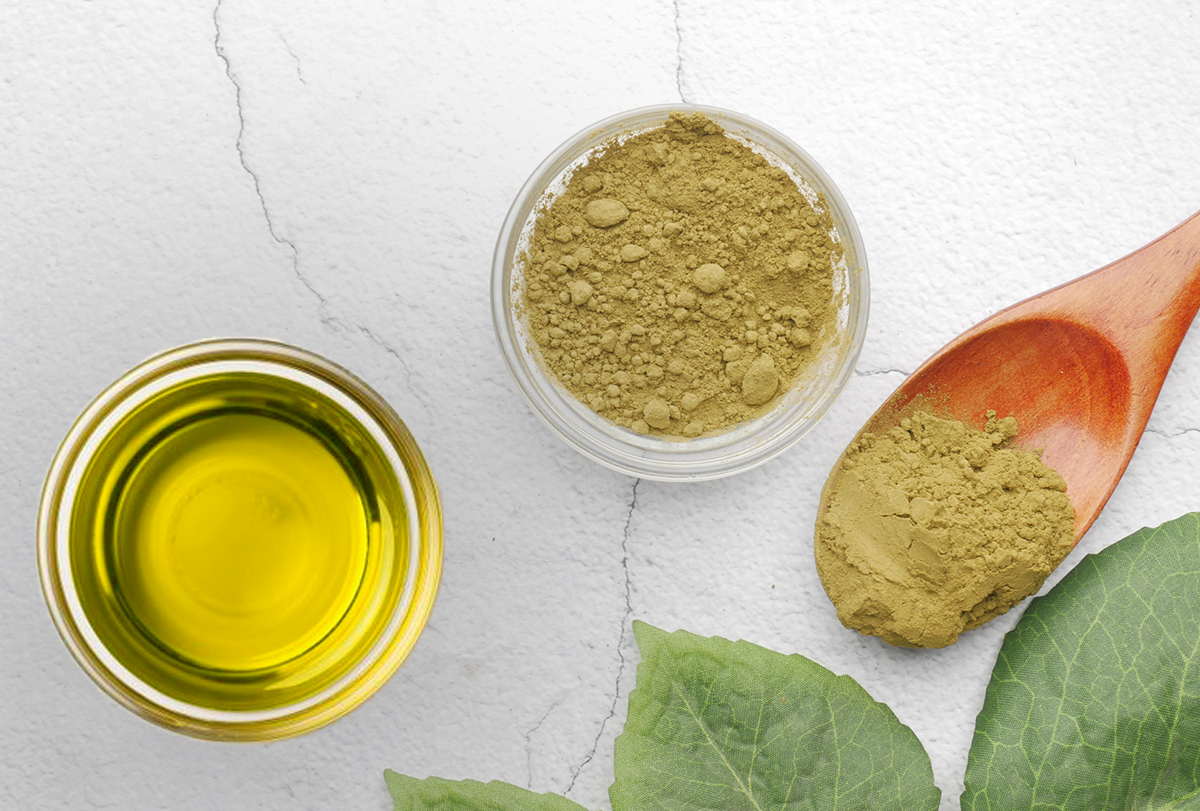
Henna is native to Africa and Asia, but it is also extensively cultivated in countries such as Sudan, Egypt, and India.
Scientific research has revealed a range of beneficial properties associated with henna. It has been found to have anti-inflammatory effects, along with antibacterial and coloring/dyeing properties, (1) making its oil a good candidate for hair care products where it has been famously used for years.
Continue reading to explore the many benefits, cautions, recipes, and side effects of using henna oil on the hair.
Benefits of Using Henna Oil for Hair
Here are some benefits of using henna oil on the hair.
1. Treats androgenetic alopecia (hair loss)
Henna has shown promising therapeutic effects in promoting hair growth and treating androgenetic alopecia.
A study conducted on a mouse with androgenetic alopecia demonstrated that henna in combination with other ingredients caused increased hair density and significant improvement in hair growth. (2) It is believed that henna oil worked by reducing androgen content in the local skin tissue.
These findings suggest that henna oil could be beneficial for individuals experiencing hair loss or seeking to improve hair growth. (2)
2. Colors and dyes hair
Henna oil has always been used as a biological colorant for hair. The active component in henna oil is lawsone, a pigment known for its fast dyeing properties. (3)
Lawsone gives the plant its distinctive red-orange hue. It is present in dried henna leaves at a concentration of 1%-1.5% w/w.
Lawsone is considered a nonoxidizing hair coloring agent and can be used in cosmetic products at a maximum concentration of 1.5%. This compound, hence, behaves as an alternative to chemically made hair pigments, presenting a safer and gentler approach to hair coloring. (4)
In a study, a formulation containing a combination of henna, along with other herbal extracts, showed a remarkable coloration effect on human hair. (5)
3. Resolves dandruff problems
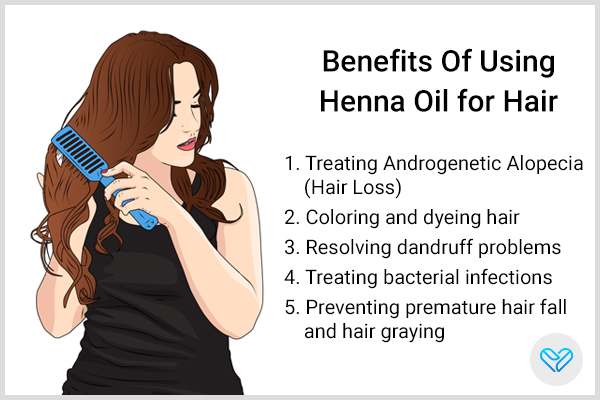
Dandruff is often triggered by an overgrowth of a yeast-like fungus called Malassezia on the scalp. Henna has been found to possess antifungal activity that can support the management of dandruff.
In a study, an extract of henna was good at completely inhibiting the growth of Malassezia in around 14 days, highlighting how henna can be used as a natural antidandruff remedy and can provide individuals with dandruff relief from the scalp condition. (5)(6)
4. Treats bacterial infections
A study found that extracts of henna leaves exhibit significant antibacterial activity against various bacteria commonly associated with skin infections.
The results showed that the henna extracts effectively inhibited the growth of bacteria such as Staphylococcus aureus, ß-hemolytic streptococci, and Pseudomonas aeruginosa, sometimes with better results compared to antibiotics.
This is why henna could be a natural alternative for managing bacterial scalp infections. (7)
5. Prevents premature hair fall and hair graying
According to a study that focused on naturally available hair color products, henna balances the pH of the scalp, which is important for the prevention of premature hair fall and graying.
Thus, applying henna to the hair and scalp can also protect from the early onset of hair graying or hair loss. (8)
Side Effects of Using Henna Oil on the Hair
Henna oil does offer a lot of hair benefits, but it also comes with some side effects that you should be aware of.
1. Allergic reactions
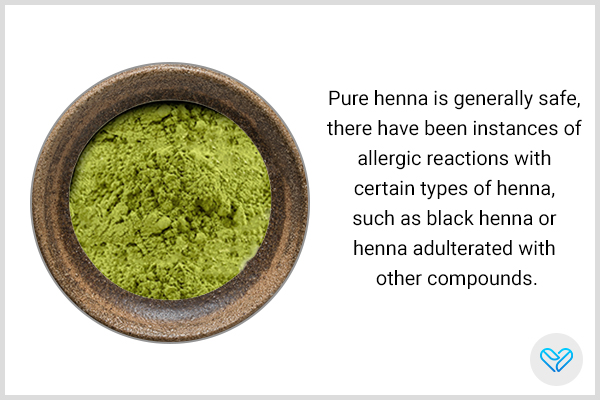
While pure henna is generally safe, there have been instances of allergic reactions with certain types of henna, such as black henna or henna adulterated with other compounds. (9)
Note: It’s important to note that it’s usually the additives para-phenylenediamine (PPD), 2-nitro-4-phenylenediamine, 4-aminophenol, and 3-aminophenol, not the henna itself, that can cause allergies. (8)
In terms of skin reactions, red henna is considered safe, with only rare cases of contact allergy and hypersensitivity. However, people with glucose-6-phosphate dehydrogenase deficiency may experience severe complications when using henna.
Black henna tattoos containing PPD can cause contact allergies in around 2.5% of individuals. If sensitized, these individuals may also develop allergic reactions to hair dyes containing PPD, as well as other substances such as textile dyes and rubber chemicals. (10)(11)
2. Other possible adverse effects
In recent times, there has been a practice of mixing PPD with natural henna to achieve a black color instead of the traditional orange/reddish hue.
However, this new trend of using PPD in henna art has raised concerns regarding potential health risks associated with PPD exposure.
Adverse effects such as acute allergic contact dermatitis, eczema, chemical burns, acute renal failure, severe angioneurotic edema, abdominal pain, and vomiting have been extensively documented in the literature. (12)
How Long Does It Take for Henna to Stain Hair?
While natural henna staining typically takes 4–12 hours, the inclusion of PPD can reduce this time to just an hour or two, resulting in a longer-lasting effect.
However, it is important to recognize that adverse health effects are specifically associated with the use of henna containing PPD, commonly known as black henna. (12)
DIY Recipes for Henna Oil for Hair Application
Henna Oil Mask
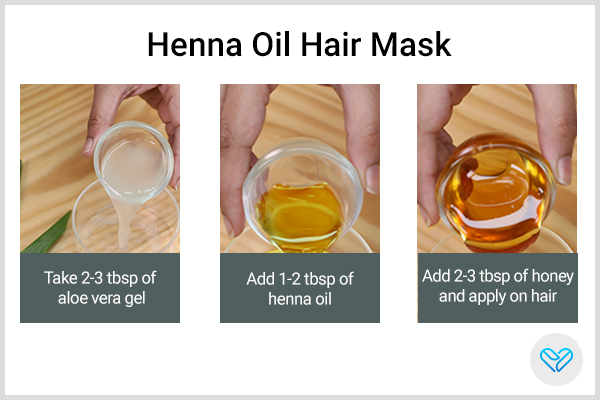
- Mix 1-2 tbsp of henna oil, 2-3 tbsp of aloe vera gel, and 2-3 tsp of honey.
- Apply the mixture to slightly wet hair, beginning from the hair roots and making your way down to the strands.
- Massage the mask well on your scalp.
- Let the mask stay on for about 30 minutes to 1 hour.
- Wash your hair with water and shampoo as you normally would.
Henna Oil Rinse
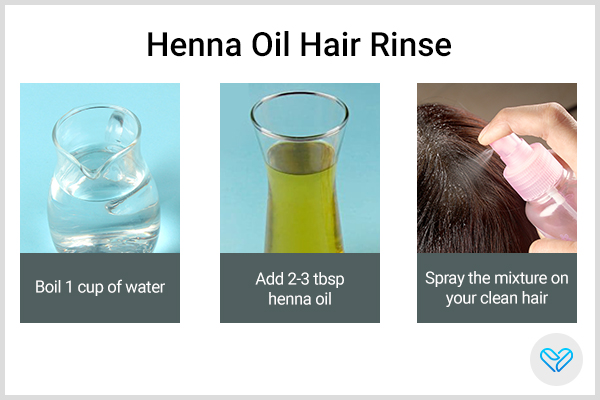
- Boil 1 cup of water. Add 2-3 tbsp of henna oil to the hot water and stir well.
- Allow the mixture to cool till it reaches room temperature.
- Shampoo your hair and rinse it.
- Spray the mixture on your hair.
- Gently massage your scalp and leave it for 5-10 minutes.
- Wash it off with room-temperature water.
- You can wash your hair with mild shampoo to remove excess oil.
Henna Oil Serum
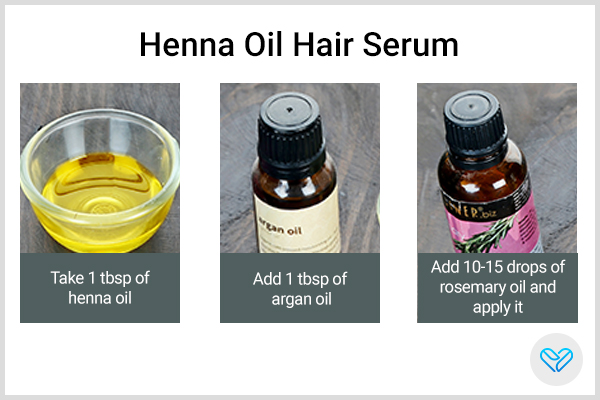
- Add 1 tbsp of henna oil, 1 tbsp of argan oil, and 10-15 drops of rosemary essential oil to a bottle.
- Close the bottle and shake well.
- Apply a few drops of this serum to your fingers and rub your hands together.
- Gently run your hands through damp or dry hair.
Most-Asked Questions
Does henna oil help with hair loss?
Henna oil may help reduce hair loss.
Is henna oil safe for all hair types?
Yes, pure and natural henna oil is generally safe for all hair types.
Can henna oil be applied to chemically treated hair?
Yes, henna oil is safe to use on chemically treated hair.
Does henna oil have a strong smell?
Henna oil has a natural earthy scent.
Can henna oil be used as a scalp remedy?
Yes, henna oil can be applied to the scalp to nurture and comfort the scalp.
Final Word
Henna oil offers numerous benefits for the hair, including dyeing the hair and treating dandruff. It is generally safe for all hair kinds and can be utilized on chemically treated or color-treated hair.
However, some people may encounter allergic responses or sensitivities to henna oil, so patch testing is recommended.
- Was this article helpful?
- YES, THANKS!NOT REALLY


